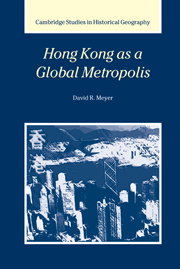Book contents
- Frontmatter
- Contents
- List of figures
- List of maps
- List of tables
- Preface
- 1 Enigma
- 2 Intermediaries of capital
- 3 From Canton to Hong Kong
- 4 Hub of the China trade
- 5 Chinese and foreign social networks of capital
- 6 Trade and finance center for Asia
- 7 Industrial metropolis
- 8 Global metropolis for Asia
- 9 Hong Kong, China
- Bibliography
- Index
- Cambridge Studies in Historical Geography
4 - Hub of the China trade
Published online by Cambridge University Press: 28 July 2009
- Frontmatter
- Contents
- List of figures
- List of maps
- List of tables
- Preface
- 1 Enigma
- 2 Intermediaries of capital
- 3 From Canton to Hong Kong
- 4 Hub of the China trade
- 5 Chinese and foreign social networks of capital
- 6 Trade and finance center for Asia
- 7 Industrial metropolis
- 8 Global metropolis for Asia
- 9 Hong Kong, China
- Bibliography
- Index
- Cambridge Studies in Historical Geography
Summary
The new tariff and port regulations are really very moderate and favourable, and if strictly adhered to by the Chinese, our trade with England is sure to increase very much. The drug trade continues to prosper.
Trade dilemma
In their home nations, British merchants observed bustling urban centers and American merchants saw a prosperous agricultural economy with rising farm incomes. The merchants viewed these as lucrative markets for commodities and manufactures, but they remained woefully ignorant about the Chinese market. Under the new trade regime, foreign merchants needed market information; yet, prohibitions on travel in China prevented them from gaining personal acquaintance with its internal economy. The lower Yangtze valley was one of the few areas the foreign merchants knew about, based on the later military campaigns of the Opium War; nevertheless, outsiders readily misinterpreted it. Extraordinarily high productivity per acre disguised low marginal productivity of labor and limited peasant purchasing power. Rising opium consumption by the gentry and urban professional classes hid the deflation that wracked China. Captain Charles Elliot, the British Chief Superintendent of Trade at Canton during the late 1830s, never believed that a vast Chinese market was waiting to be plucked by the merchants – but that remained a minority view. Alexander Matheson, a principal in the greatest China house, Jardine, Matheson & Company, expressed the majority view: trade would grow at the treaty ports and opium would remain lucrative.
- Type
- Chapter
- Information
- Hong Kong as a Global Metropolis , pp. 52 - 77Publisher: Cambridge University PressPrint publication year: 2000



